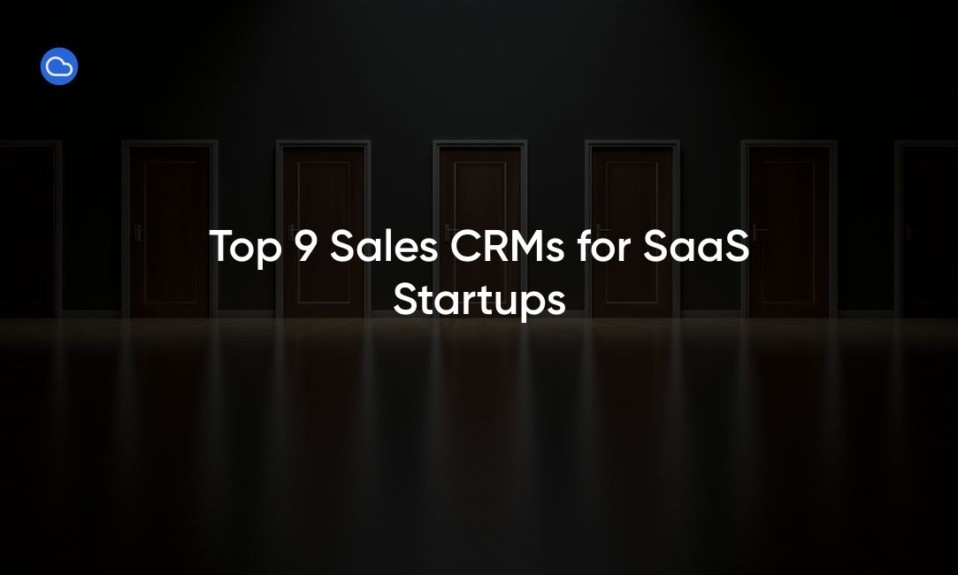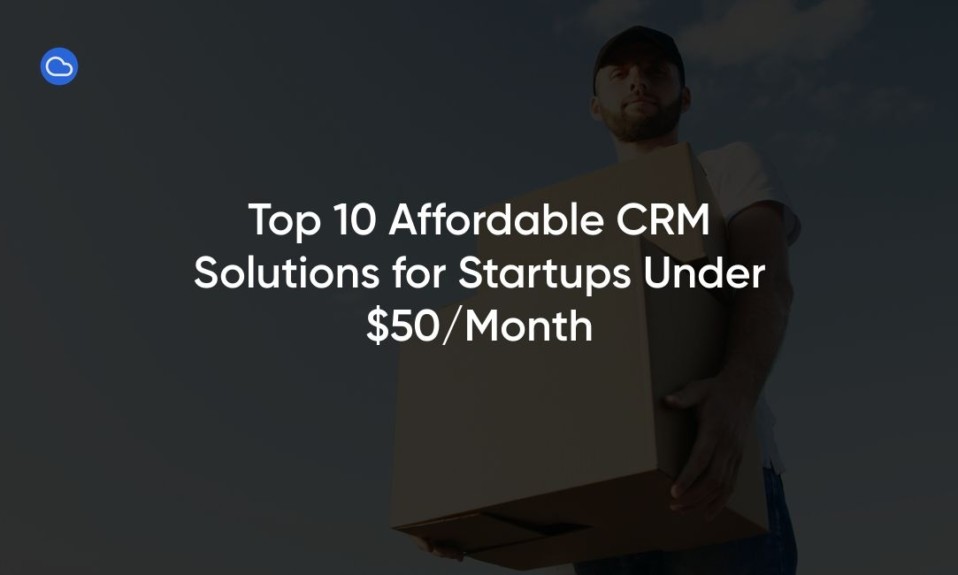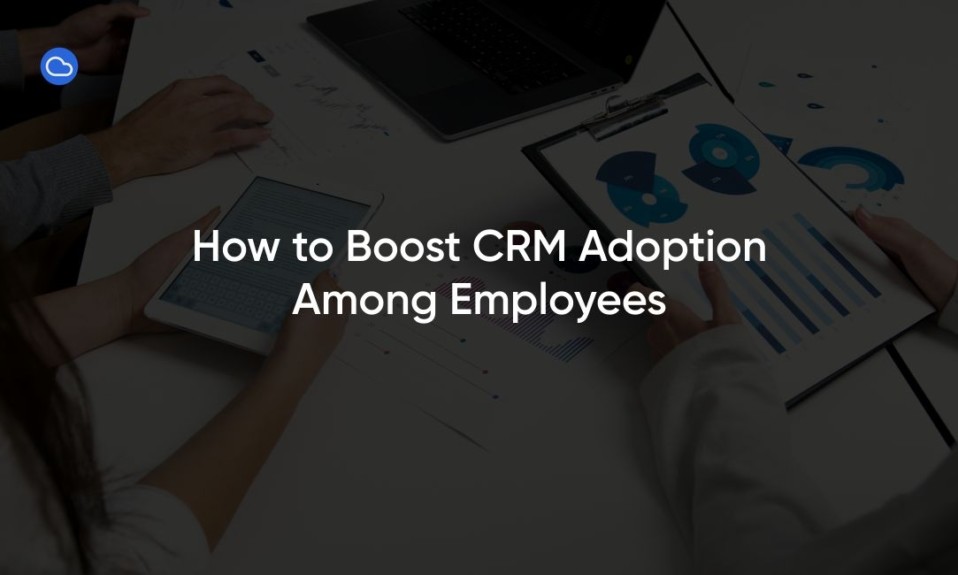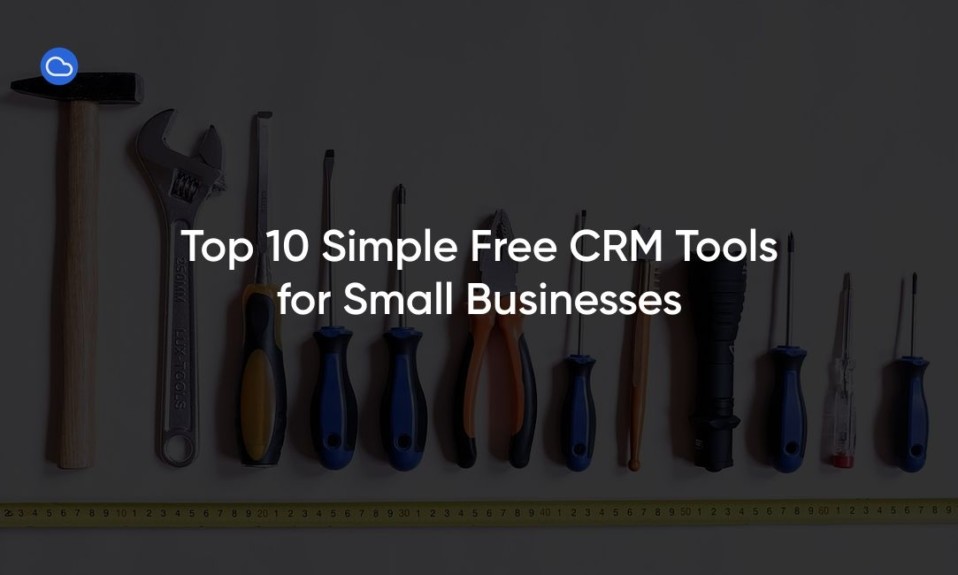Finding the right CRM feels overwhelming when your SaaS startup needs to track subscriptions, expansions, and churn simultaneously.
Without a specialized CRM for SaaS startups, you’re probably struggling with spreadsheets that can’t handle recurring revenue or customer lifecycles.
The good news?
We’ve tested and ranked the top solutions designed exactly for your subscription model challenges.
You’ll discover which platforms nail SaaS-specific features like MRR tracking and seamless payment integrations.
Plus, you’ll get clear comparisons on pricing flexibility and scalability as your team grows.
What is a SaaS CRM
Software-as-a-Service Customer Relationship Management systems, commonly known as SaaS CRMs, offer a modern approach to managing customer interactions. Unlike traditional CRM systems that require heavy infrastructure and maintenance, SaaS CRMs operate in the cloud.
This means you access your CRM through the internet without needing complex software installations. (Pretty convenient, right?)
I’ve experienced the benefits of using a SaaS CRM firsthand. Cloud-based solutions make scaling easy as your startup grows — no need for extensive hardware. The flexibility of a subscription model allows businesses to pay for what they need.
Many platforms provide automatic updates and maintenance, saving time and resources. SaaS CRMs integrate seamlessly with other cloud applications, enabling your team to connect tools for sales, marketing, and customer support.
The way I see it, this interconnectedness enhances efficiency and leads to better decision-making. Real-time data access provides insights into customer behavior, which is crucial for improving your strategies.
Ultimately, SaaS CRMs allow for streamlined processes that traditional systems often struggle to match. This superior adaptability can significantly impact your startup’s growth journey.
Why do SaaS startups need CRM software
Successful SaaS startups require effective management tools to thrive. I personally believe that adopting a CRM for SaaS startups leads to enhanced customer relationships and streamlined operations.
Understanding customer journeys and preferences makes a significant difference in your growth.
CRM systems simplify customer lifecycle management. You gain insights into how customers interact with your brand. This information allows you to tailor your services and communicate more effectively.
I’ve seen how using customer relationship management tools helped businesses improve customer engagement significantly.
Tracking subscriptions is another vital aspect. Revenue optimization hinges on knowing when customers renew or churn. A robust CRM tracks these subscription details, providing clarity on your monthly recurring revenue.
At Top CRM, we’ve experienced the value of having accurate data at our fingertips when making crucial business decisions.
Consider the actionable insights a CRM provides. With detailed analytics, you can identify trends and opportunities for upselling. I’m pretty sure that the right CRM can transform your approach to customer management.
You can enhance your business by being proactive rather than reactive. For those interested in exploring CRM benefits further, visit this link for more insights.
Key features to look for in a CRM for SaaS startups
Subscription and recurring revenue management
CRMs must effectively handle your subscription billing cycles and churn tracking. I’ve seen how important it is for SaaS businesses to monitor monthly recurring revenue (MRR).
Without proactive management, revenue can take unexpected dips. Using a robust CRM allows you to automate invoicing, ensuring customers are billed on time.
This eliminates confusion and increases your cash flow. Churn tracking is another vital aspect — understanding why customers leave helps you adjust your offerings.
I’ve experienced first-hand how feedback loops incorporated within a CRM lead to valuable insights that enhance customer retention strategies. Meaningful MRR calculations provide a clear picture of your growth.
They guide your scaling efforts, helping plan future investments. When you know your MRR, it becomes easier to allocate resources effectively.
Customer lifecycle tracking
Monitoring customer journey stages from trial to paid subscription is critical for SaaS success. With features like onboarding automation, you create smooth transitions that help users adopt your product effectively.
I’ve seen firsthand how investing in customer lifecycle tracking can uncover expansion revenue opportunities. You gain insights keeping customers engaged throughout their journey.
A solid CRM for SaaS should allow you to analyze user behavior and identify pain points. Implementing effective onboarding automation helps ensure that customers realize your product’s value quickly.
By focusing on these stages, SaaS startups can proactively respond to customer needs, fostering loyalty and reducing churn. For deeper insights into customer behavior, consider exploring dedicated resources like this analysis on customer behavior.
Integration capabilities
SaaS startups thrive on seamless operations. I find that integration capabilities play a pivotal role in achieving that harmony.
The right CRM helps you connect various tools, enhancing efficiency. Popular SaaS tools include payment processors and analytics platforms.
Imagine effortlessly syncing your customer data across systems — it simplifies your workflow. Marketing automation systems also find a home here.
These integrations allow for streamlined communication and targeted outreach. I’ve noticed that startups often benefit significantly from automating repetitive tasks.
It frees your team to focus on building relationships. At Top CRM, we emphasize the importance of these connections.
A well-integrated CRM creates a holistic view of your customer interactions. Certain CRM platforms excel in offering robust integration features.
Scalability and pricing flexibility
CRM solutions must adapt as your startup evolves. I truly think that finding a CRM that can scale with your needs is fundamental.
Startups often face growth spurts, needing tools that can promptly adjust to increasing customer volumes. When selecting a CRM for your SaaS business, look for platforms that offer flexible pricing tiers.
This allows you to pay only for what you use. You’ll avoid financial strain by adapting your plan as your customer base grows.
For instance, some CRMs provide packages that span from basic features at low costs to advanced functionalities at higher prices. This flexibility can be a game-changer for startups, making budgeting straightforward.
You can start small, grow, and expand features as necessary without switching tools entirely. I’ve encountered scenarios where companies wasted time migrating data and retraining teams due to an inflexible system.
Top 9 CRM solutions for SaaS startups
HubSpot CRM
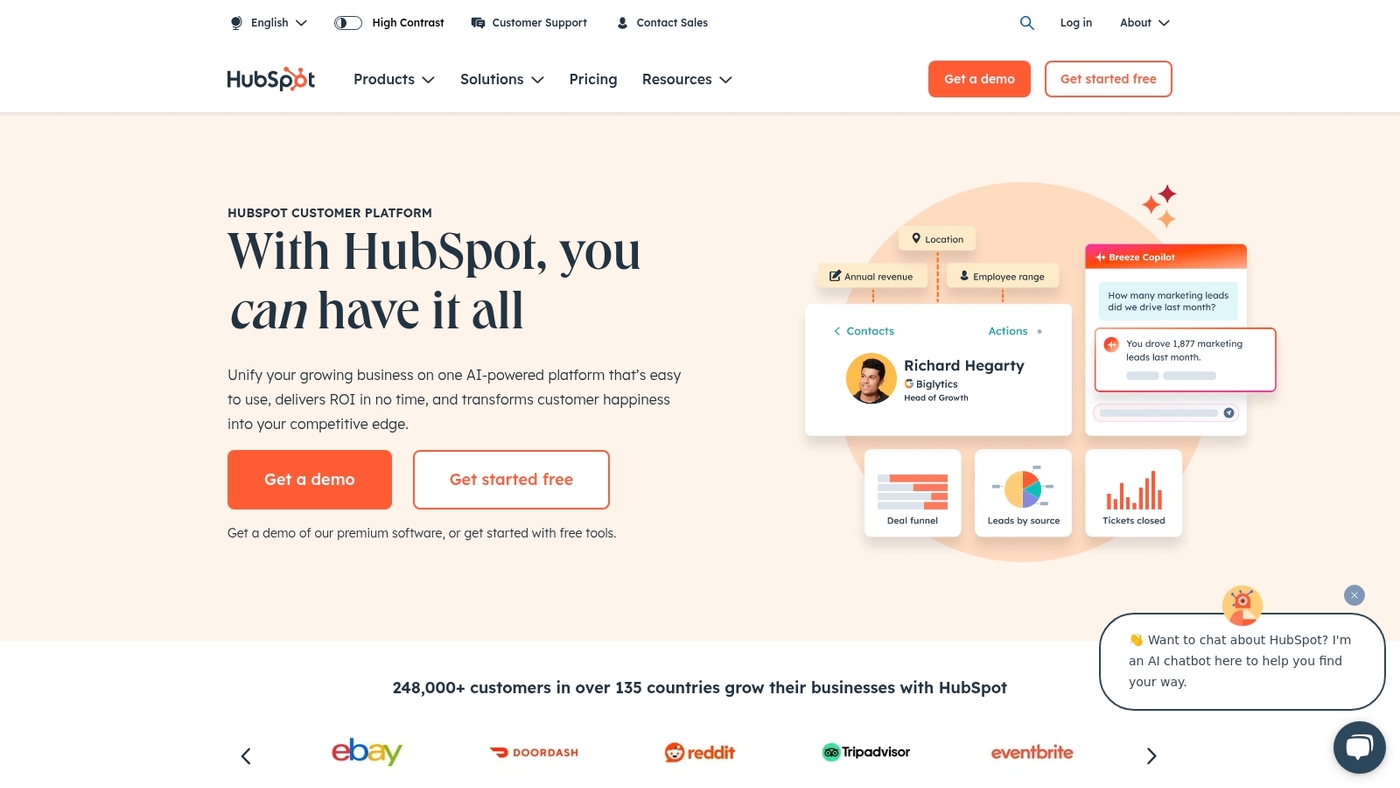
HubSpot CRM stands out as a free-to-start platform that integrates powerful marketing automation, sales pipeline management, and detailed reporting features.
This is particularly significant for growing SaaS companies seeking a comprehensive solution. I’ve been using HubSpot for tracking leads and personal insights, and its user-friendly interface truly makes organization effortless.
The dedicated features for sales and marketing teams facilitate a seamless workflow, aligning perfectly with the dynamic needs of SaaS startups.
| Avantages | Inconvénients |
| Free-to-start model for initial use | Advanced features often require paid subscription |
| Robust marketing automation tools | Initial setup can be overwhelming |
Pour qui? This CRM is designed for SaaS startups aiming to streamline their sales and marketing processes, particularly those new to customer relationship management.
Prix: HubSpot CRM offers a free tier, with additional features available through various paid plans that cater to different business needs.
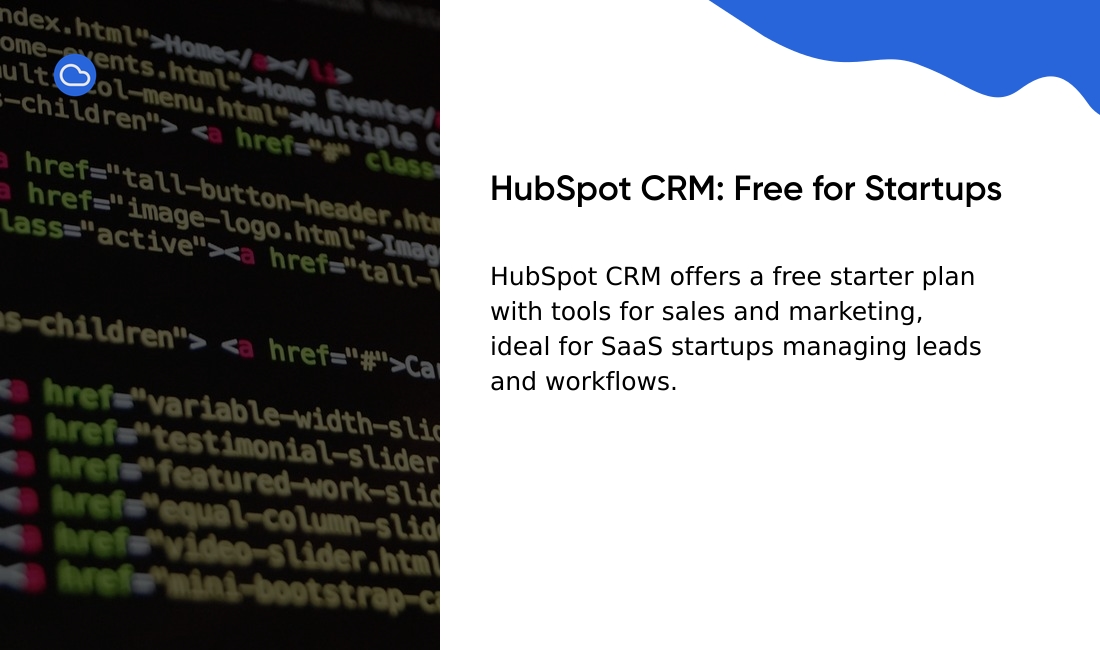
Pipedrive
Pipedrive is a visual sales pipeline tool that excels in activity tracking and deal management. This CRM is designed with SaaS sales teams in mind, offering a straightforward interface that fosters a deep understanding of sales processes.
It provides real-time insights into performance metrics, helping you stay organized and focused on what matters most. I use Pipedrive for managing sales activities, and I appreciate its mobile accessibility, which allows me to track deals on the go.
This functionality becomes invaluable for staying updated and engaged with clients, especially in dynamic work environments.
- Avantages: Intuitive visual pipeline for easy deal tracking, strong integration capabilities with other SaaS tools
- Inconvénients: Some features can be overwhelming for new users, pricing may increase as more advanced features are needed
Pour qui? Pipedrive is perfect for SaaS startups and sales teams looking for a user-friendly solution that enhances visibility into sales activities and performance.
Prix: Pipedrive offers several pricing tiers, starting at $15 per user per month, which scales based on additional features and capabilities.
Close CRM
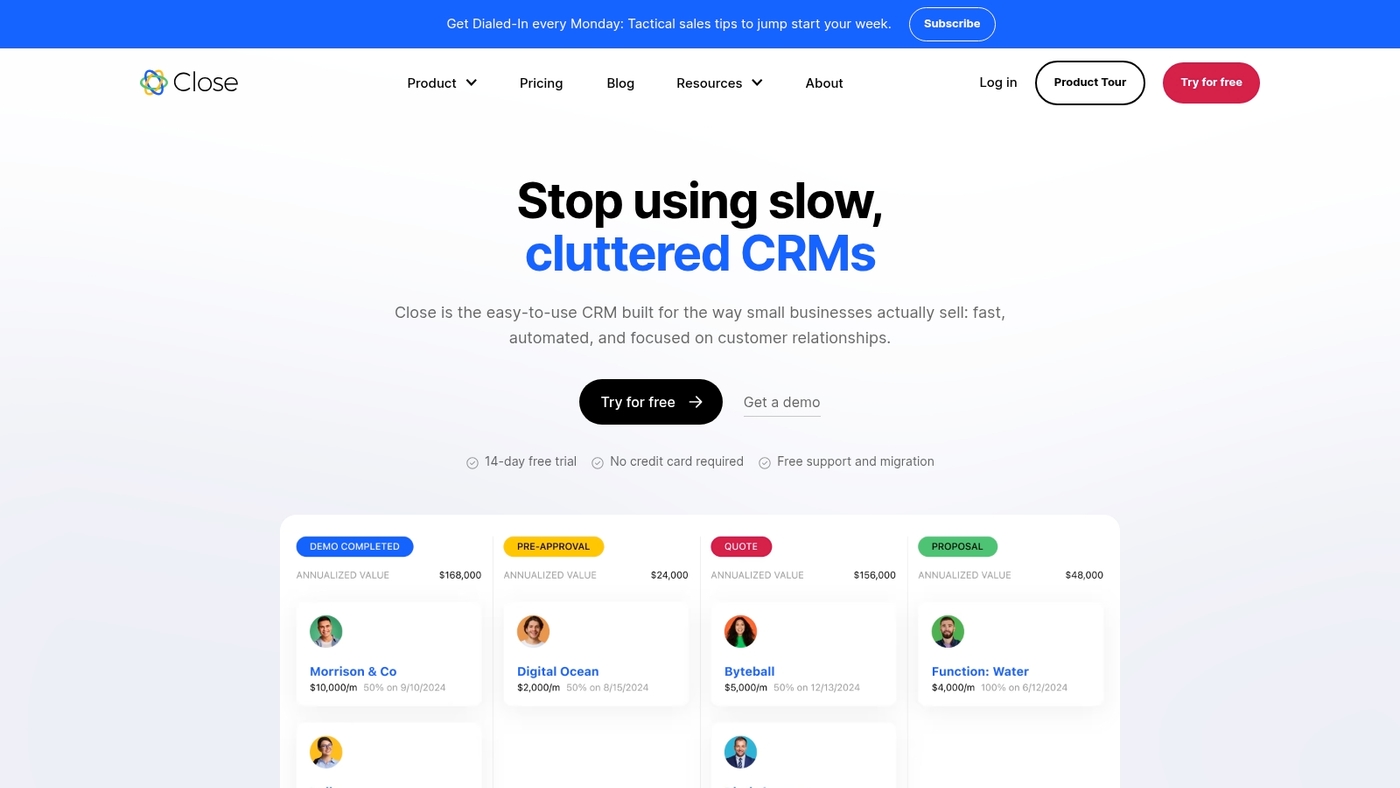
Close CRM focuses on communication, making it ideal for outbound SaaS sales. It integrates calling, SMS, and email features all within one platform.
Starting at $9 per month, this software aims to streamline communication and enhance sales performance. I truly think its built-in tools help in transforming outreach efforts.
Close allows teams to respond more effectively to leads, ultimately increasing conversion rates. (And let’s be honest — who doesn’t want better conversion rates?)
- Avantages: Integrated calling, SMS, and email functionalities; affordability at $9 per month
- Inconvénients: Limited advanced analytics compared to larger CRMs; primarily focused on outbound sales
Pour qui? Close CRM suits SaaS startups focused on enhancing their outbound sales strategies, particularly those that prioritize communication efficiency.
Prix: Starts at $9 per month, with additional pricing tiers available based on feature requirements.
Salesforce Sales Cloud
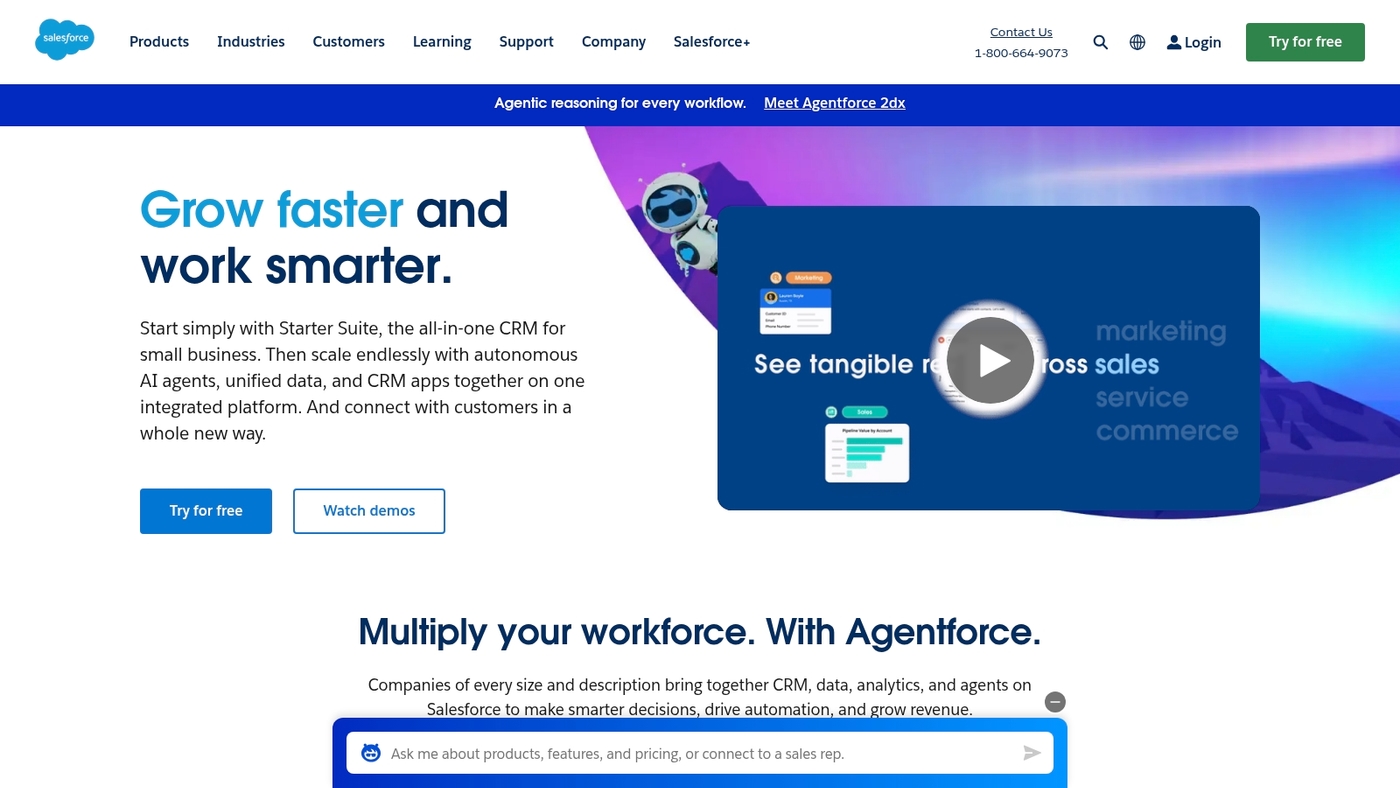
Salesforce Sales Cloud serves as a robust, enterprise-grade CRM designed specifically for dynamic SaaS businesses.
Its powerful customization options allow you to tailor the platform to your unique processes. I’ve seen firsthand how its AI-powered insights can drive better decision-making and enhance productivity.
The extensive third-party integrations create a seamless experience among various tools, making it a perfect choice as you scale your operations. This platform doesn’t just manage relationships — it elevates them, turning raw data into actionable strategies.
- Pros: Highly customizable to fit specific business needs, AI-powered insights for enhanced decision-making
- Cons: Can be expensive for small startups, complex features may have a learning curve
For who? This platform targets growing SaaS companies needing an advanced CRM solution that scales with their business.
Pricing: Pricing varies based on your chosen plan, starting from approximately $25 per user per month for core features.
Zoho CRM
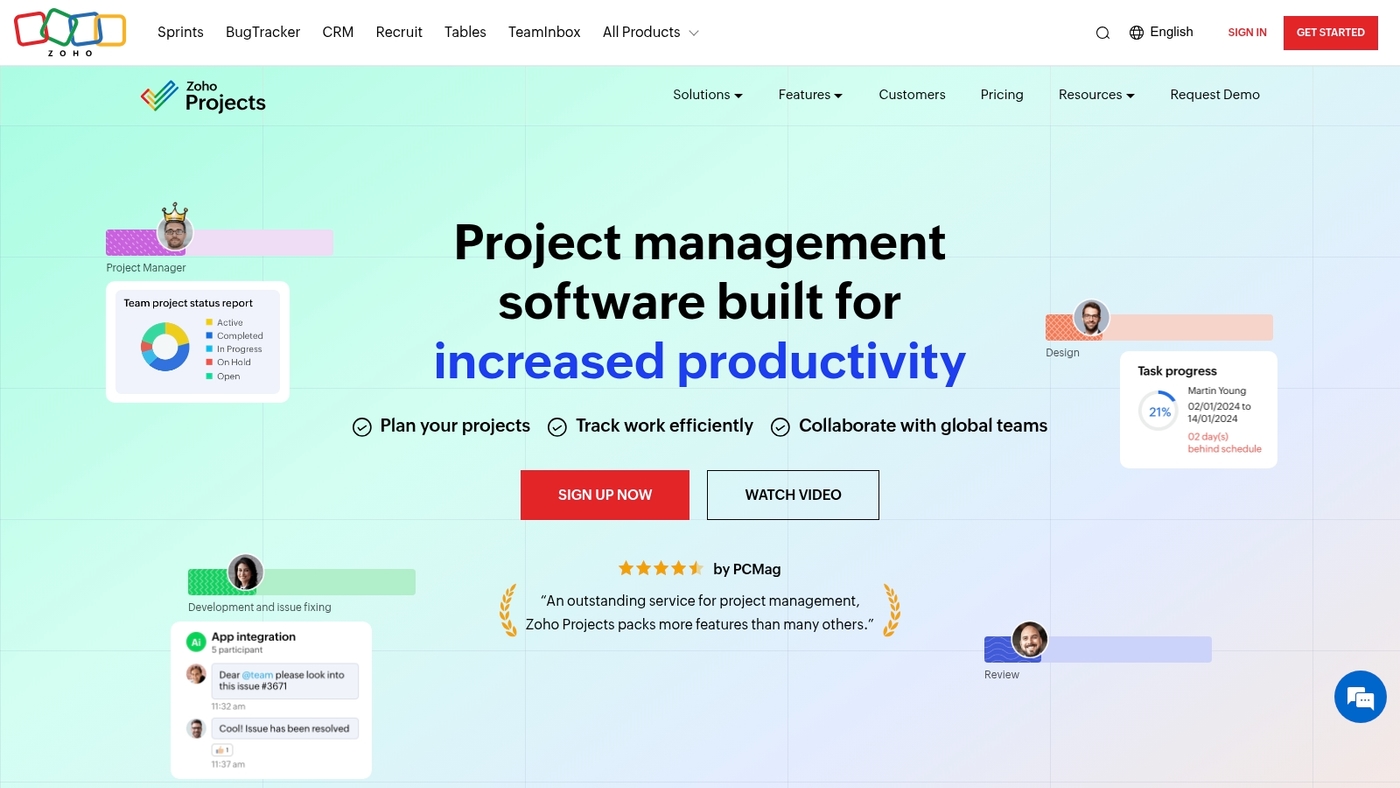
Zoho CRM offers a cost-effective solution tailored for budget-conscious startups. With features like workflow automation, social media integration, and comprehensive analytics, it aligns well with the unique needs of SaaS businesses.
I’ve found its functionalities to be intuitive and supportive for small teams looking to streamline customer interactions. You can easily manage your customer relationships while leveraging insights that drive your sales strategy.
Well, let’s face it — every startup needs to watch their budget carefully!
- Avantages: Affordability without compromising on features, robust automation tools that simplify workflows
- Inconvénients: Can be overwhelming for users new to CRMs, some advanced features require paid plans
Pour qui? This CRM solution is ideal for startups seeking cost-efficient customer relationship management tools that still offer comprehensive capabilities.
Freshsales
Freshsales is a user-friendly CRM tailored for small to medium SaaS teams. Its intuitive interface streamlines processes like lead scoring, email tracking, and phone integration.
The platform delivers significant value, particularly for startups aiming to enhance their customer relationship management without navigating complex systems. I’ve found that using Freshsales makes it easier to monitor interactions and prioritize leads effectively.
With these tools at your disposal, you can focus on what really matters: building and nurturing customer relationships.
- User-friendly interface that requires minimal training
- Robust lead scoring system for better prioritization
- Effective email tracking capabilities
Pour qui? This CRM is ideal for small to medium SaaS startups looking to streamline customer management and gain insights into sales processes.
Capsule CRM
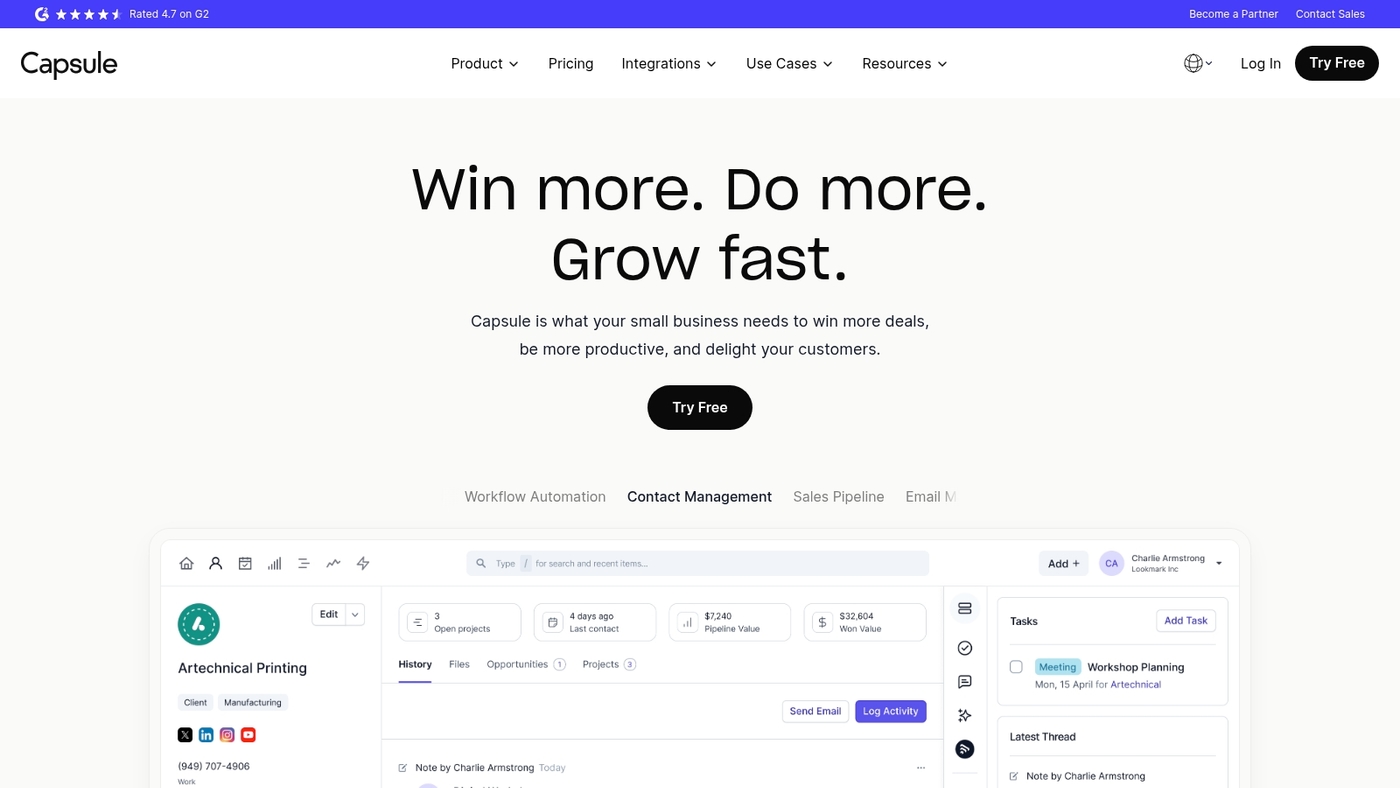
Capsule CRM offers a highly customizable platform, making it an excellent choice for SaaS startups. This CRM provides a free plan for up to 250 contacts, allowing new businesses to test its features without financial commitment.
Advanced functionalities are available at $12 per user per month, catering to the needs of growing companies. Capsule’s interface is user-friendly and focuses on managing customer relationships effectively, which is crucial for startups aiming to enhance customer retention and engagement.
I find its adaptability to different business requirements particularly valuable, as it allows you to tailor your CRM experience to match your specific workflow.
- Avantages: Highly customizable to fit specific needs, free plan available for small teams
- Inconvénients: Some advanced features require higher pricing, lacks extensive reporting capabilities compared to competitors
Pour qui? Capsule CRM is ideal for startups seeking a flexible and cost-effective solution to manage customer relationships.
Prix: The pricing starts with a free plan for 250 contacts, progressing to $12 per user per month for professional features.
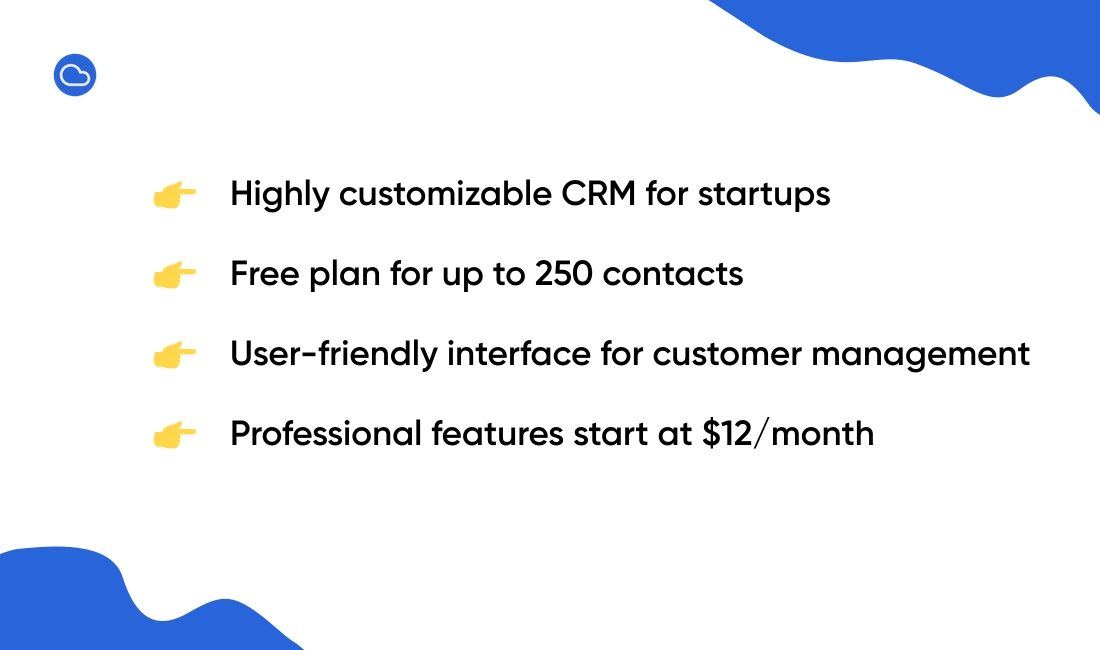
Zendesk Sell
Zendesk Sell serves as a sales-focused CRM designed primarily for SaaS companies. Its impressive integration with customer service supports effective communication and relationship management.
I have observed that its activity tracking and mobile capabilities allow sales teams to stay organized and responsive. You can foster better client relationships through timely interactions and manage all your sales activities from a single platform.
This focus on customer support truly makes it a standout option for SaaS startups seeking to enhance their client management process.
- Avantages: Strong integration with customer support, mobile capabilities enable on-the-go activity management
- Inconvénients: May require time to fully adapt to all features, pricing can increase with additional features and users
Pour qui? Zendesk Sell is ideal for SaaS startups that prioritize strong customer service and wish to streamline sales processes.
Monday Sales CRM
Monday Sales CRM offers a unique visual project management approach to customer relationship management. With customizable workflows, teams can manage their sales process effortlessly.
The platform encourages collaboration, ensuring that every team member stays informed. The transparent pricing structure is appealing for startups that need clarity in their budgeting.
This allows you to focus on scaling your business rather than stressing over hidden costs. I find the visualization aspect not only intuitive but also helpful in getting a quick overview of our sales pipeline.
- Avantages: Customizable workflows tailored to your sales process, robust team collaboration features
- Inconvénients: Initial learning curve for new users, some advanced features may require additional costs
Pour qui? This CRM is ideal for SaaS startups looking for a flexible and user-friendly solution to manage their sales activities effectively.
You’ll also like: How to Boost CRM Adoption Among Employees – top-crm
How to choose the right CRM for your SaaS startup
Selecting the right CRM for your SaaS startup can shape your business’s future. I’ve seen firsthand how the right choice often leads to better customer relationships and operational efficiency.
Every startup has unique needs, so evaluating a few key areas can truly help guide your decision-making process.
Begin with your team size. A small team might benefit from a user-friendly platform that requires minimal training. Larger teams may need advanced features to coordinate various departments.
Understanding your budget is vital as well. Some CRMs offer flexible pricing options that can grow with you, while others might present a significant initial investment.
I believe that balancing functionality with your budget leads to the best outcome. Have you considered which features are absolutely essential versus nice-to-have?
Assess technical requirements as well. Ensure that the CRM integrates smoothly with existing tools like your email platform or analytics software. These integrations enhance overall productivity.
Beyond that, align your CRM choice with your specific SaaS business needs. For instance, subscription tracking and customer lifecycle management capabilities are crucial for SaaS models.
For more detailed guidance on implementing your CRM, explore our CRM implementation guide. Actually, choosing the right CRM is just the beginning — proper implementation makes all the difference!
Read also: How to Calculate Customer Lifetime Value: A Guide – top-crm

